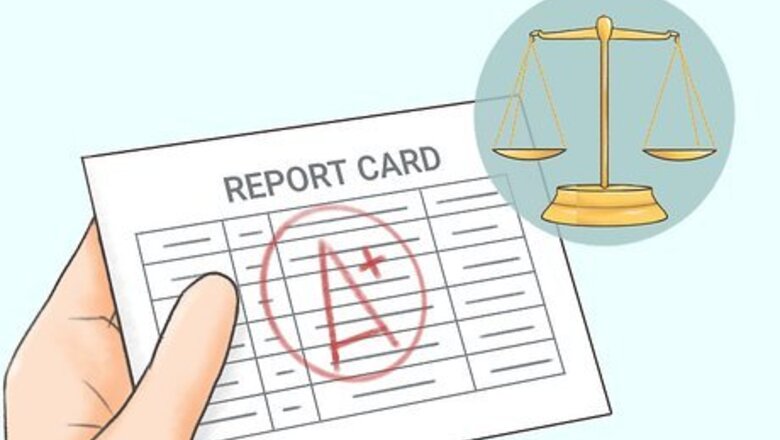
views
Identify what motivates you.
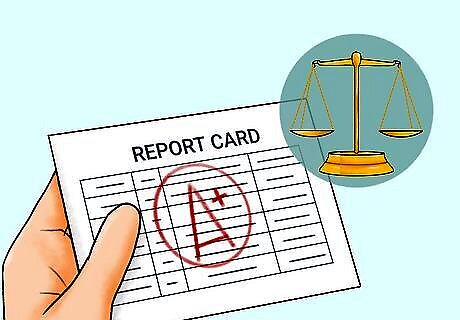
Having a core internal motivation will keep you disciplined. External motivations—like rewards, bonuses, or treats—are great if you want to accomplish something in the short term. But internal motivations—the things at the core of your identity that matter to you are way more powerful. Meditate on what it is that gets you out of bed in the morning and focus on that. You’ll have a much easier time developing discipline if you do. For example, let’s say you want to get a good grade in Physics. Is it just for that external motivation of having a good letter on your report card, or is there something deeper and more important at play? Maybe you want to be a lawyer when you grow up and getting good grades in school is a part of that, or maybe you want to prove to yourself that you’re able to learn and master new skills!
Take care of your body.

Exercise regularly and get plenty of sleep to stay in tip-top shape. It’s hard to be disciplined when it comes to schoolwork and personal goals if you’re not looking after yourself physically. Practice good hygiene by showering daily, brushing your teeth, and flossing. Aim to get at least 8 hours of sleep every night, and work out at least 3 times a week to stay active and healthy. Being disciplined with your physical health makes it a lot easier to be disciplined in other parts of your life. You’ll also simply feel better when you get up in the morning! Avoid temptations. Don’t ride your bike past all those fast-food restaurants if you’re hungry; leave a party if someone starts drinking or doing drugs. For parents: Model good self-care practices yourself. If your child sees you waking up late, lounging on the couch, and skipping workouts, they might be more likely to follow suit.
Set reasonable, concrete goals.
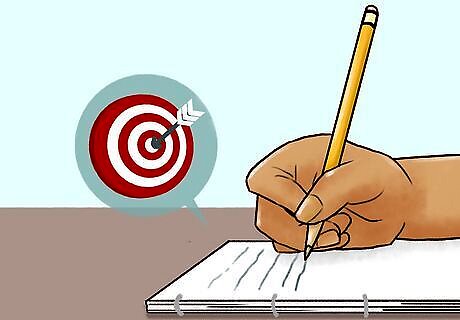
Identify what you want, write it down, and work towards it. Whether it’s a specific grade in a class, a personal achievement, an extracurricular goal, or a financial goal, make it clear and specific. Once you have the goal in mind, write it down and post the goal somewhere visible in your locker, home, or bedroom. This way, you can keep that goal in front of your mind as you work towards achieving it. One method for setting goals is to check to see if each goal is SMART. That’s Specific, Measurable, Achievable, Relevant, and Time-bound. For parents: Check in with your teen periodically to see how the progress goes. These little checks can be a great way to remind your child that it’s important to stick to goals.
Maintain a regular schedule.

A disciplined schedule will help you stay healthy and productive. Go to bed at roughly the same time every night and wake up at the same time every day. Try to eat your meals around the same time every day as well. The more consistent your daily schedule is, the easier it will be to maintain control of the other aspects of your life. Sharpening those time management skills is a huge part of being disciplined. Try to keep the same schedule on the weekends, too. It’s hard to get back into a weekly routine if you immediately abandon that routine at the end of the week. For parents: If you can make things easier by waking your teen up when you get up, for example, do it. But don’t let them use you as a crutch. If they can’t develop a routine on their own, let them experience the consequences.
Do your best.

Regardless of whatever you pursue, put your best foot forward. In school, don’t slack off while studying, avoid asking teachers for extensions you don’t need, and turn in every homework assignment you’re given. If you’re trying out for the basketball team, practice daily, get in shape, and play as often as possible to be ready for tryouts. Whatever you choose to do in life, put the effort in. The more often you try your hardest to achieve the goals you set, the easier it will be to stay focused and on-task in the future. For parents: Politely encourage your teen to get back on task if you see them getting distracted or procrastinating.
Stay confident.

Believe in yourself and know you can achieve your goals. It’s easy to fall into a spiral so self-doubt if you’re trying to achieve discipline for the first time, so fight back against that little voice in your head that tells you it’s impossible to get the results you want. If you can believe in yourself, it’ll be a lot easier to build the discipline you need to achieve your goals. If you struggle to stay confident, pick one thing you’re really good at and do it at least once a week. This can be a good reminder that you’re capable of mastering things. For parents: If you see your teen struggling with their self-image, remind them of all the things they’re good at. Just be careful about extending the truth too far; teens aren’t completely unaware of where their limitations are.
Be supportive of others.

Helping others will help you build a culture of motivation and support. Building self-discipline on your own can be a serious challenge, but if you put your positive energy out into the universe, it’ll come back to you. When you see your classmates or friends struggling, encourage them to stick with it. If a friend needs help with homework, break the books out with them. The more you support others, the more supportive they’ll be of you. On top of this, you’ll feel a lot better about yourself if you encourage others. This can help you stay confident and focused on your own journey. For parents: Be supportive of your teen—especially when you see them supporting others. The more positive of an environment you make your home, the happier your teen will be about putting in work at school, home, or work.
Visualize success.

Picturing yourself achieving goals will help maintain a positive attitude. Whenever you’re struggling or worried about an upcoming task, close your eyes and picture yourself overcoming the obstacle. Visualizing what you want and actually seeing it happen will help you stay upbeat, productive, and focused. It’s easy to get frustrated or bent out of shape if you feel like success is impossible. This is where visualization can help you change your orientation so that the impossible becomes possible.
Ask others to hold you accountable.

If you feel like you lose focus regularly, ask someone for help. You could ask a close friend or teammate to help, or you might ask a sibling or parent whom you live with for support. Explain that you want help to stay disciplined and that you need a second set of eyes to help you stay sharp. With a little bit of help in your corner, you’ll have no problem developing the discipline you want to cultivate. For example, if you really want to be disciplined when it comes to staying on top of your schoolwork, you could ask your mom to call you out if she sees you watching TV from 4-6 pm when you get home. For parents: Try to avoid negative consequences when your teen isn’t on task.
Tackle tough tasks with the Pomodoro technique.
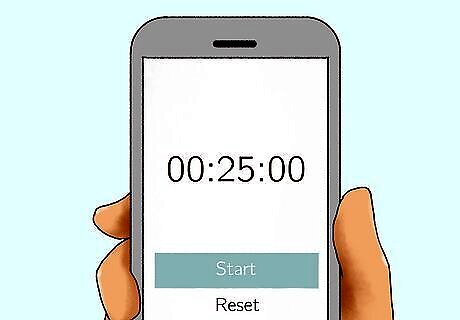
If you want more discipline when you work, try measured breaks. Employing the Pomodoro technique involves taking calculated breaks to maximize your focus and maintain efficiency. To use it, set a timer for 25 minutes and get to work on whatever you want to accomplish. When the timer goes off, take a 3-minute break. Repeat this process until you’ve completed 4 cycles and then take a 15- to 30-minute break. This is the best way to stay on task without overloading your ability to focus and be productive. This is a great way to turn big tasks, like finishing a quarterly report or writing a final paper, into smaller and easier-to-tackle chunks.
Reward yourself for achievements.

Positive rewards are a great way to develop a growth mindset. Whenever you stay on task, achieve a goal, or reach a key benchmark, give yourself a reward. It could be a dessert or some other sweet you’ve been avoiding while trying to lose weight, or it might be an hour of video games after a long night of studying. This will help you build positive associations with your work, give you a sense of purpose, and help you feel like your discipline is getting you closer to your goals. For parents: Shower your teen in praise when they hit their big targets. Show them that you’re just as proud of them as they are of themselves.
Monitor your progress.
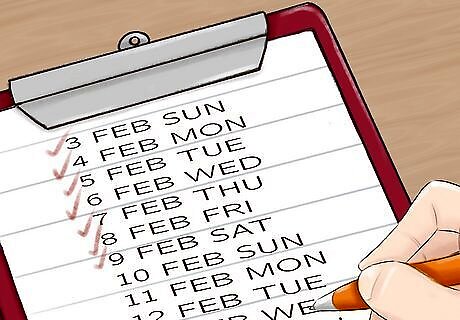
Keep track of how you’re doing to catch problems before they start. If you’re focused on being more punctual, track how often you’re on time or early for work/school. This way, if you start losing momentum, you’ll be able to spot it immediately and fix things before they get out of hand. Tracking your progress will also make your accomplishments so much more rewarding since you’ll feel yourself closing in on that finish line. Even if it’s just a short note you make in your phone at the end of each day, you’ll benefit immensely from the process.
Practice regular self-care.

Avoid burnout by respecting your need for breaks and self-love. It’s extremely easy to feel like you’re running out of energy if you aren’t taking care of your emotional and mental health. Celebrate yourself when you do well, take frequent breaks, and schedule time to pursue your hobbies and do things you enjoy. Building discipline shouldn’t feel like punishment, so take care of yourself if you’re running low on fumes. Engaging in daily gratitude and reminding yourself of all the things you have to be thankful for can go a long way when it comes to avoiding burnout. For parents: Remember, you can always “tell” your teen to take a break. If you think they’re overdoing it, tell them to come on a walk with you or take the dog out.
Take it easy on yourself.

Building self-discipline can be tough, so don’t beat yourself up. It’s easy to get kind of bent out of shape when things don’t go perfectly—especially if you’re actively trying to be the best version of yourself. Don’t get down if you encounter a few bumps on the road to self-discipline. Be kind to yourself and engage in self-compassion. Whatever mistakes are made can be repaired with hard work and honesty. For parents: If you see your teen starting to get down on themselves or getting really angry whenever they miss the mark, remind them that you’re there for them. If there’s a break coming up, it might be a good time for a vacation!



















Comments
0 comment